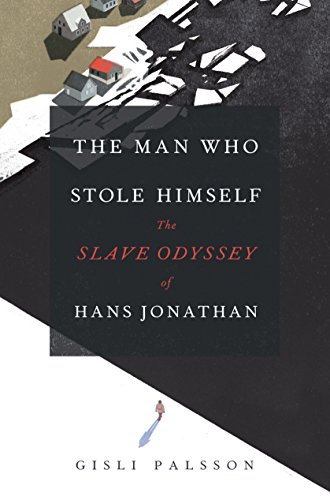Back in 2019, I read an interesting book that combined genealogy and non-fiction story telling. The book is called: The Man Who Stole Himself:The Slave Odyssey of Hans Jonathan. The book was written by Icelandic professor of anthropology, Gísli Pálsson, and documents the journey of a former Caribbean slave from St. Croix to Denmark and finally to Iceland. In GoodReads, I reviewed the book and wrote:
“As an amateur genealogist with mixed roots from the Caribbean, I enjoyed reading this book and learning about the life of Hans Jonathan. From St. Croix, to Denmark, and finally Iceland – this book recounts the life of an enslaved man who essentially “steals himself”. The author does a great job at giving historical context and uses actual documents from Hans’ life to bring his story to life. Recommended to those interested in learning about slavery through the lens of an enslaved man, giving voice to a people who were in history voiceless”. (5 stars)
I highly recommend the book to anyone interested in genealogy, slavery, the Caribbean, or even how people can move around and reinvent themselves. Though my genealogical work is mainly in Puerto Rico, I think it is important to read and learn about genealogical practices and learn stories from other countries and cultures that could be helpful to your own research.

Not only was it an interesting book to read but it also opened my eyes to other genealogical possibilities, such as the possibility of being an academic professor who researches and writes about genealogy the way Gísli Pálsson did in his book. Not only that, but I later learned that a scientific article was written about Hans Jonathan and the use of DNA to reconstruct his genome and I was floored – could I really dedicate my life to something similar?!
Genealogy & Genetics
In January 2018, a paper was published in regards to Hans Jonathan and DNA, titled: “Reconstructing an African haploid genome from the 18th century” written by various authors. Citation below:
Jagadeesan, A., Gunnarsdóttir, E.D., Ebenesersdóttir, S.S. et al. Reconstructing an African haploid genome from the 18th century. Nat Genet 50, 199–205 (2018). https://doi.org/10.1038/s41588-017-0031-6
The article is behind a pay wall so if you are interested in reading the article it won’t be as easy to just download it. It’s very science heavy so if you’re interesting in learning about Hans Jonathan but not the science behind it, I definitely recommend the book over the article. However, if you’re a genealogist interested in genetics as well it might be worth reading the article after you have read the book.
The article mentions the use of DNA from various descendants (182 of 788) from Hans Jonathan and how they use this shared DNA amongst them to reconstruct part of his maternal genome (about 38%). By doing so and isolating pieces of DNA tied to African origins (likely all via his mother, since his father was expected to be a European man), the article mentions connections to Benin, Nigeria, and Cameroon “with the greatest value, of 0.186 (95% CI 0.1861-0.1866), observed for the Yoruba of Benin” (pg. 203).
Towards the end, the article mentions: “To our knowledge, this study demonstrates the first use of genotype data from contemporary individuals, along with information about their genealogical relationships, to reconstruct a size-able portion of the genome from a single ancestor born more than 200 years ago” (pg. 204).
Granted, they do acknowledge that this was made easier by the fact that Hans Jonathan entered a fairly homogenous population in Iceland without ties to Africa. But it makes me question, what is going to be possible soon with genetic and genealogical studies like this becoming more popular and viable?
I imagine there will come a time where we will be able to identify African born ancestors via shared DNA both in the new and old world, tying together communities via paper trail and DNA.
Recently, 23andMe released an article on how they’ve added more Ethnolinguistic groups in Africa to Ancestry Composition. (I’m excited for my profiles to update!!)
The Future of Genealogy & Genetics
As time moves forward and genetics and genealogy come more to the forefront of both the United States and the world, I think this field will become an interesting place to be a part of. I would love to carve out a little place for myself here, representing Puerto Rico and the use of genetics/DNA to tie ourselves back to our indigenous and African ancestors, people who for centuries had remained name-less and largely unidentified. For sure there is a lot to be analyzed, much of Puerto Rican society has been a mix of cultures coming together and melding itself into one we call “Boricua”.
But how can we parse through the documents and DNA to discover the more intimate parts of our island and history? How can I, for example, find and give voice to my French Caribbean ancestors who on paper only go back to “d’Afrique” (from Africa) with new cutting edge technology in genetics?
Definitely excited for the future of genealogy and genetics and this means for genealogists like me!

